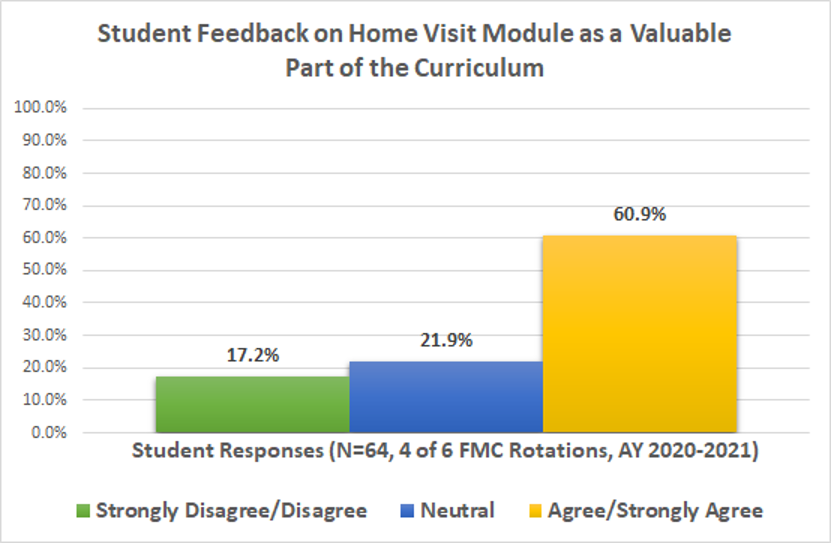A Virtual Home Visit Module for Family Medicine Clerkship Students
by Ebony B. Whisenant, MD, and Ashley Saucier MD, Medical College of Georgia at Augusta University; and Nana Aisha Garba, MD, PhD, Florida International University Herbert Wertheim College of Medicine
Background
Chronic diseases are among the leading causes of death and disability in the United States,1 and their development and management are often tied to social determinants of health (SDOH).2 Social determinants not only affect people’s health, well-being, and quality of life, but also impact health outcomes and contribute to health disparities and inequities.1 Therefore, it is essential that medical education curricula prepare the future health care workforce to understand SDOH, their impact on chronic diseases, and how they influence health disparities and inequity. Several medical education programs have been using home visits to teach their students about SDOH and their effect on the health outcomes of patients in vulnerable communities.3,4 In an effort to improve quality and access to care for aging and vulnerable populations, home visits are reemerging as a health care delivery model,5 because they provide opportunities to better understand the social determinants that impact patients’ health and ability to manage chronic conditions.6
Intervention
At the Medical College of Georgia (MCG) at Augusta University, home visits are integrated into the undergraduate medical curriculum during the family medicine clerkship (FMC). Prior to the COVID-19 pandemic, medical students on the FMC were required to complete a home visit. However, because of the pandemic and ensuing need to maintain social distance, student participation in home visits was suspended indefinitely. Given that home visits have been identified as a valuable learning experience,4,7 and based on the results of the end-of-course FMC evaluations in which 81.6% of 87 students found the home visit to be a valuable or extremely valuable part of the 2019-2020 curriculum, the FMC leadership wanted to find a way to provide a similar experience for current students. We therefore developed a virtual home visit module, utilizing prerecorded didactic content, video footage of a simulated home visit with a standardized patient, and application exercises, to introduce students to the concepts of the home visit.
The module includes the following items:
- A prerecorded didactic session introducing the concept of home visits. This session describes the benefits of home visits, explains how to prepare for a home visit, lists the core components of a home visit assessment, recommends ways to identify community resources for patients, and provides students with additional home visit-related references for further reading.
- A case presentation for students to review a patient’s record in preparation for a home visit.
- A simulated clinical scenario depicting a home visit with a patient who has multiple chronic diseases, medication adherence concerns, and an inability to make an office visit.
Results
Students’ engagement and understanding of the module objectives was assessed via a written assignment that required them to complete the following activities:
- Identify pertinent historical elements that indicate a patient’s barriers to health promotion and chronic disease self-care management;
- Describe a patient’s ability to perform activities of daily living (ADLs), source(s) of support, and SDOH that could impact medical care;
- Complete a comprehensive medication reconciliation exercise;
- Develop a comprehensive problem list for a patient with multiple medical conditions; and
- List community resource availability for screening, prevention, and management of medical conditions.
Finally, students reflect on the experience and how it may impact their approach to patient care. At the conclusion of each rotation, students complete an evaluation form that allows them to provide feedback on the FMC and its curricular activities. Students are asked to indicate the extent to which they agree that the home visit module is a valuable part of the curriculum. Preliminary student feedback from the current academic year demonstrates that on a 5-point Likert scale with responses rated from strongly disagree to strongly agree, 61% of students agree or strongly agree that the home visit module is a valuable part of the FMC educational experience (Figure 1).
Figure 1

Conclusions
This version of home visit affords students a structured learning experience to improve their understanding of the impact of social determinants on patients’ health and disease management outside of the ambulatory office setting during the pandemic. Next steps will focus on refining technical aspects of the learning experience and aligning the application activity with entrustable professional activities.
References
- Chronic Diseases in America. Centers for Disease Control and Prevention. Updated January 12, 2021. Accessed November 26, 2020. https://www.cdc.gov/chronicdisease/resources/infographic/chronic-diseases.htm
- Cockerham WC, Hamby BW, Oates GR. The social determinants of chronic disease. Am J Prev Med. 2017;52(1S1): S5-S12. doi:10.1016/j.amepre.2016.09.010
- Whisenant EB, Garba NA, Schneider GW, et al. The Community engaged physician: teaching social accountability through interprofessional teamwork and service‐learning. New Dir Teach Learn. 2020;2020(162):135-143. doi:10.1002/tl.20398
- Sagi D, Spitzer-Shohat S, Schuster M, Rier D, Rudolf MCJ. Learning social determinants of health through a home visiting course in the clinical years. Patient Educ Couns. 2020;103(11):2335-2341. doi:10.1016/j.pec.2020.05.002. http://www.sciencedirect.com/science/article/pii/S0738399120302433
- Clair MCS, Sundberg G, Kram JJF. Incorporating home visits in a primary care residency clinic: the patient and physician experience. J Patient Cent Res Rev. 2019;6(3):203-209. Published 2019 Jul 29. doi:10.17294/2330-0698.1701.
- Rerucha CM, Salinas R Jr, Shook J, Duane M. House calls. Am Fam Physician. 2020;102(4):211-220. https://www.aafp.org/afp/2020/0815/afp20200815p211.pdf
- Hervada-Page M, Fayock KS, Sifri R, Markham FW Jr. The home visit experience: a medical student’s perspective. Care Manag J. 2007;8(4):206-210. doi:10.1891/152109807782590628
